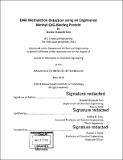| dc.contributor.advisor | Hadley D. Sikes. | en_US |
| dc.contributor.author | Tam, Brooke Elizabeth. | en_US |
| dc.contributor.other | Massachusetts Institute of Technology. Department of Chemical Engineering. | en_US |
| dc.date.accessioned | 2019-07-22T19:36:53Z | |
| dc.date.available | 2019-07-22T19:36:53Z | |
| dc.date.copyright | 2018 | en_US |
| dc.date.issued | 2018 | en_US |
| dc.identifier.uri | https://hdl.handle.net/1721.1/121898 | |
| dc.description | Thesis: Ph. D., Massachusetts Institute of Technology, Department of Chemical Engineering, 2018 | en_US |
| dc.description | Cataloged from PDF version of thesis. | en_US |
| dc.description | Includes bibliographical references (pages 96-103). | en_US |
| dc.description.abstract | DNA methylation, specifically the methylation of cytosine bases, is an important biomarker, as abnormal DNA methylation patterns are found in many different types of cancer. Currently, a small number of cancer hospitals evaluate the methylation status of the MGMT gene promoter to determine the best course of treatment for patients with glioblastoma. However, improved methylation detection techniques are required in order to expand the availability of such testing to more patients. Methyl-CpG-binding domain (MBD) proteins bind specifically to methylated DNA sequences, and many assays have been developed that use these proteins in methylation profiling of DNA. The wild-type proteins in the MBD family bind specifically to symmetrically methylated CpG dinucleotides. Here, I have engineered a new MBD variant that binds to hemi-methylated DNA but not unmethylated DNA, allowing for the detection of a methylated target sequence hybridized to a simple, unmethylated DNA probe. | en_US |
| dc.description.abstract | With four amino acid substitutions, a protein that did not show any binding to hemi-methylated DNA at concentrations up to 100 nM was altered to bind hemi-methylated DNA with high affinity. Based on equilibrium binding titrations, this engineered variant binds a DNA sequence with a single hemi-methylated CpG dinucleotide with a dissociation constant of 5.6 ± 1.4 nM. After engineering a protein to bind hemi-methylated CpG dinucleotides, I developed a simple, hybridization-based assay to determine the methylation status of the MGMT promoter using this protein variant and magnetic microparticles. The target DNA molecules are captured on the surface of magnetic microparticles and an MBD-GFP fusion protein is added to bind if the captured target is methylated. Therefore, MBD binding can be detected directly based on fluorescence of the microparticles after the binding step without requiring any chemical conversion or additional labeling steps. | en_US |
| dc.description.abstract | In addition to simplifying the assay and eliminating the need for methylated capture probes, I was able to improve the sensitivity of the assay to 5 pM target DNA. Finally, I also studied the DNA capture and MBD binding events to identify the key parameters and guide future efforts to develop clinically relevant diagnostics. | en_US |
| dc.description.statementofresponsibility | by Brooke Elizabeth Tam. | en_US |
| dc.format.extent | 103 pages | en_US |
| dc.language.iso | eng | en_US |
| dc.publisher | Massachusetts Institute of Technology | en_US |
| dc.rights | MIT theses are protected by copyright. They may be viewed, downloaded, or printed from this source but further reproduction or distribution in any format is prohibited without written permission. | en_US |
| dc.rights.uri | http://dspace.mit.edu/handle/1721.1/7582 | en_US |
| dc.subject | Chemical Engineering. | en_US |
| dc.title | DNA methylation detection using an engineered methyl-CpG-binding protein | en_US |
| dc.type | Thesis | en_US |
| dc.description.degree | Ph. D. | en_US |
| dc.contributor.department | Massachusetts Institute of Technology. Department of Chemical Engineering | en_US |
| dc.identifier.oclc | 1103316488 | en_US |
| dc.description.collection | Ph.D. Massachusetts Institute of Technology, Department of Chemical Engineering | en_US |
| dspace.imported | 2019-07-22T19:36:51Z | en_US |
| mit.thesis.degree | Doctoral | en_US |
| mit.thesis.department | ChemEng | en_US |
